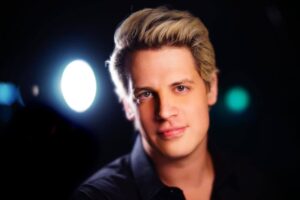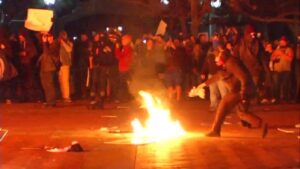by The Cowl Editor on February 9, 2017
Opinion


by Taylor Godfrey ’19
Asst. Opinion Editor
In a world of fake news and “alternative facts,” it can sometimes be difficult to decide where to draw the line between free speech and hate speech. But under a president who has no problem ignoring his people’s calls for change and tweeting that “any negative polls are fake news,” it is a problem we must address. Much of the tension surrounding this issue came to a head at the University of California Berkeley campus on the night of Feb. 1. Right-wing writer and blogger Milo Yiannopoulos was booked by the University of California, Berkeley College Republicans to speak on campus.
This announcement was followed by 100 faculty members signing letters of protest, as well as people arriving at the event to protest in person. As the night went on, however, the peaceful protest devolved into a riot that resulted in the cancellation of the event. After that night, many are calling the students’ protest an affront to the freedom of speech guaranteed in the Bill of Rights. Leaving aside the riots that endangered students’ safety, however, the calls for cancellation of the event did not violate freedom of speech. The protesters at Berkeley did not infringe on Yiannopoulos’s right to free speech. They did not shut down his website. They did not forbid him from speaking at other places. They did not put him in prison for saying things they disagreed with. The students and faculty at Berkeley did not silence Yiannopoulos, they simply refused to give him a megaphone, and that is really the big difference.
According to the New York Times, the faculty letters calling for the cancellation of the event cited a speech that Yiannopoulos gave to the University of Wisconsin in which he harassed a transgender student by name. He has also been banned from Twitter for inciting attacks on celebrity Leslie Jones. Despite what he might have said at this appearance at Berkeley, his past actions indicate that he is not opposed to being highly offensive and even stooping to the level of hate speech. It is clear why students would not want such a person to speak at their school. It is a good thing to listen to opposing views and expose yourself to people who you do not agree with. However, opening a discourse to debate and discuss political ideas, especially about sensitive subjects, should be done with respect from both sides. From what Yiannopoulos has said and done in the past, a discourse with him would be anything but respectful or even civil.
It is important, especially now, to understand and protect freedom of speech. Students and faculty did not want Yiannopoulos to speak at their school, not because of his right-wing ideas, but because of the way he often delivers them interspersed with hateful speech. They simply did not want his often hate-filled ideals to be associated with themselves and their school. But this is about more than one protest and riot on one college campus. This is an issue which has been at the forefront of the political scene since the early days of Trump’s campaign. Trump often lashes out at programs and people that speak negatively about him. He has called news stations like CNN “fake news” when they report things he does not like.
These practices could easily devolve into something much worse. We need to be watchful that these do not become something that really does violate the tenets of the freedom of speech.